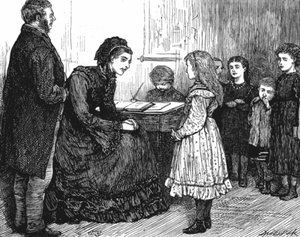What people think of ELT - Part 1

What people think of ELT - Part 2
What people think of ELT - Part 3
I was having coffee with several of the mummies from York the other day and the conversation shifted to the end of our maternity leave and how we felt about going back to work. I suggested that some of the mummies might enjoy English language teaching and make great TEFL (Teaching English as a Foreign Language) teachers, and I was then told, “My English is not good enough to become a TEFL teacher.”
I was stumped and it took me more than a beat to rearrange my thoughts, and the only response I could come up with was, “Uh…well, the definition of ‘good English’ might differ depending on what we are talking about.”
Sometimes when you are so involved in what you do, you forget that the world you operate in might not be at all familiar to those who are not in the same industry. At the same time, the view of those from a different world can be interesting, and even enlightening for us to contemplate upon.

I thought back to the non-ELT people I have spoken to over the years, including fresh CELTA trainees who had just come on the course without much knowledge of what they were getting themselves into, and here are some of the things I have heard:
“TEFL teachers need to teach their students to use big words like sesquipedalian and gasconade.”
“ I need elocution lessons to become a TEFL teacher.”
“My grammar is not good enough to become a TEFL teacher.”
“You have to speak the students’ first language to be a good TEFL teacher.”
“You have to be a native speaker to be a TEFL teacher.”
“I am not good at performing in front of an audience and I dislike attention. I would make a terrible TEFL teacher.”
 This prompted me to wonder what those not involved in English language teaching might think of what we do, and so I send out this message via SMS and on Facebook to my non-ELT friends:
This prompted me to wonder what those not involved in English language teaching might think of what we do, and so I send out this message via SMS and on Facebook to my non-ELT friends:
“I’m writing a blogpost about what people not involved in English language teaching think about what we do. Could you offer a couple of sentences about what you think we do, and how you would feel about becoming an English teacher yourself?”
And here are some of the responses I received:
“I think you guys try to teach the basics of English to students whose native language is not English. You try to teach skills to enable students to communicate effectively in English, mainly verbally. You probably don’t necessarily concentrate on English spelling and grammar, and you probably use speaking, reading, listening and writing tasks to do the teaching. I would like to give it a go and would probably enjoy it but would be apprehensive. Even though it is my native language, I would feel like I was being tested…”
“I think it depends upon what sort of English is in question. Everyday colloquial English is hard I imagine for people learning English to grasp. It’s not an obvious language like perhaps German so I would have a go at teaching that but proper English grammar with theory I would struggle with! Not sure if you are including English literature but that’s not my thing. I love reading but don’t like to process it after.”
“I think that TEFL teachers help people to understand English for everyday use and teach more general/useful English than the phrases we learn in school if we learn a language. I would happily teach English to foreign language students because I believe that once you can teach and are good at it, what you teach doesn’t always have to be your main subject.”
 “I think teaching English to people with a different first language would be predominantly centred on the conversational, everyday English that someone would need to get by, in spoken and written form, with some level of how English is structured and grammar. Teachers would have to be able to explain some of the bizarre quirks and many exceptions to rules that English is littered with! Probably quite a challenge in a digital age of texting, blogs and much more casual use of language.
“I think teaching English to people with a different first language would be predominantly centred on the conversational, everyday English that someone would need to get by, in spoken and written form, with some level of how English is structured and grammar. Teachers would have to be able to explain some of the bizarre quirks and many exceptions to rules that English is littered with! Probably quite a challenge in a digital age of texting, blogs and much more casual use of language.
“I think if I were to teach English as a foreign language, it would probably teach me a lot about how I use and abuse English, the amount of slang and language shortcuts I use, plus make me appreciate the difficulties many face in learning English!”
“What do I think English teachers do?
“My sister used to teach English at an English language centre for international students. I think her sessions were "themed" i.e. fruit, animals etc. She would initially start the session by using something globally recognised, that the students could relate to i.e. a song, film, famous person.
“How would I feel about becoming an English teacher?
“I'm not sure I'd have the patience! With any projects I organise at work, I always try & make them fun, so everyone wants to participate. For example, by 3pm most of my team would start flagging at work, so I made them do 50 star jumps, whilst singing a silly song. The team enjoyed this & motivated them for the last 2 hours of the day. I would happily teach English if it was interactive & creative like this!”
“Before I met you, I figured ELT was basically the same as what we can ESL in American high schools (English as a second language), which is what immigrant children take. I realize now it is a much broader spectrum of teaching types and methodologies, all based on what each student type wants to achieve. A working knowledge? Perfection in English? If working knowledge is it for study in an English language uni or perhaps for business? Is that business scientific or otherwise? It's all a lot more interesting than I realized. I've worked with many non-native speakers as a researcher, but never thought of the mechanics of learning other than "they must have learnt it in school". Would definitely be interested in teaching English, especially for scientific styles of writing or speech :)”
In addition, we got several ELT teachers who shared my post on Facebook (special thanks to Christina Rebuffet-Broadus, Ela Wassell, Damian Williams and Emma-Louisa Mutter), and here are some of the responses we got:
“Having been a Chapter 1 Reading teacher for MANY years, I did my share of 'teaching English' as well (and I LOVED it!!) So I do know what's involved in being an Englsih teacher - working with phonics, syllabication, etc., etc.,”
“I would love to maybe teach English one day (as a foreign language). I imagine my realm of elementary education is very very different from what you do, however I would imagine we use some similar strategies for vocabulary acquisition. I feel your job consists of teaching an older student master the English language to compete at a competitive and corporate level- in other words, I think you probably go beyond conversational English. I should point out (I suppose), that my degree is Elementary Education K-8 with highly qualified emphasis in K-12 reading and English”
“I'm not an English teacher, and never will be. However, I think trying to teach English in a foreign language to others as a foreign language requires a mastery of both languages. It also requires a forward-thinking mindset to try to accommodate the cultural differences.”

The above responses got me thinking. Clearly what they thought about ELT was affected by their encounters with TEFL teachers and their own experiences with teaching in general.
I needed to know more. And I wanted to compare it to what those involved in ELT actually thought. So I went on Survey Monkey and created a survey on the views and attitudes towards what TEFL teachers do.
So, whether you are involved in TEFL or not, if you could spare about 2 minutes of your time to click on the following link and complete the survey, we would perhaps be able to have a more detailed view of how non-ELT people see our industry and how it compares to how we see our own classrooms.



Comments
Write a Comment
Comment Submitted